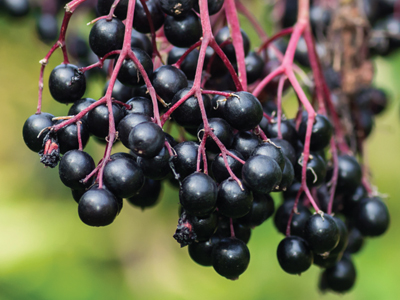Elderberry
Sambucus nigra – fruit
Various parts of the elder plant have been used for thousands of years by Native Americans and people of the Mediterranean basin and surrounding regions.
It continues to be commonly gathered as a food and medicine and, according to ethnobotanical research, is currently one of the most used medicinal plants worldwide where the berries are used primarily as antiviral agents for colds, influenza and Herpes virus infection.
Clinical research now shows that some elderberry extracts might reduce flulike symptoms, have antiviral, immunomodulating and antioxidant effects and insulin-stimulating properties.
Actions
- Immunomodulating
- Antiviral
- Antibacterial
- Antioxidant
- Anti-inflammatory
- Diuretic
Indications
- Relief of mild fever associated with common cold and flu.
- Relief of mild bronchitis, nasal catarrh, sinusitis, sore throat.
Contra-indications and Cautions
None known.
Professional supervision is suggested during pregnancy and lactation.
Administration and Dosage
The analysis of contents below is a guide only, product specific data including expiry date is with the item in the shop.
Sambucus nigra 1:1. Each 1 ml contains 1,000mg of dry herb.
Liquid extract in 25% ethanol. Use 40 to 160 ml weekly.
Our clinic uses fluid extracts from Optimal Rx, Herbal Extract Company, Nutrition Care, Mediherb or Sunray Botanicals, in this order.
Notes
Constituents of the berries include the polyphenolic antioxidant flavonoids quercetin and rutin, anthocyanins (responsible for the colour of the fruit) identified as cyanidin-3-glucoside and cyanidin-3sambubioside, the hemagglutinin protein Sambucus nigra agglutinin III (SNA-III), cyanogenic glycosides including sambunigrin, viburnic acid and vitamins (A, B1, B2, B6, B9, C and E), trace elements such as Cu, Zn, Fe and minerals such as K, Ca and Mg to phytochemicals such as carotenoids, phytosterols and polyphenols.


